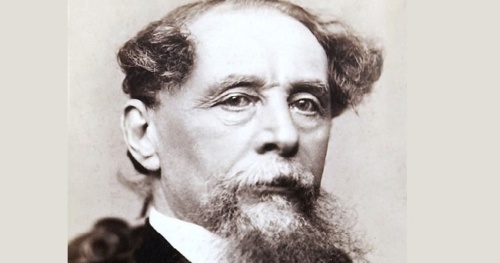Fight Racism! Fight Imperialism 226 April/May 2012

Even in this bicentenary year when media corporations are investing a lot of money, talent and time into celebrations of the great writer with events, films and television shows, the name of Dickens summons up feelings of unease when growing austerity and class divisions mark these years. The term ‘Dickensian’ still implies dire poverty, slum conditions and child labour which, however modified, are all present in Britain today.
The reputation of Dickens the man has undergone a reassessment recently following the publication of several new biographies and studies of the writer and his circle, including fellow novelist Wilkie Collins (The Woman in White), his wife Catherine and his mistress, the actress Ellen Ternan. New research shows that he was a man with many of the peculiarities and flaws that he gives his great cast of characters, over 400 in all, who feature in his novels. His relationships with women were particularly intense and his treatment of his wife, who was banished from the family home and her ten children, and Dickens’s public statement on this in The Times newspaper in 1857, have all the sensational elements of one of the author’s own plots.
Despite a scandalous private life Dickens is still applauded as the novelist of family life, hope, hard work and redemption at Christmas time. He is praised for his inventive list of characters, ‘realism’ and humour, and is appropriated in the education debate as a measure of the good days of discipline when his novels were read at grammar school. Lined up with Shakespeare as part of the unrivalled canon of English literature he was once studied by millions of schoolchildren all across the British Empire. It was this Empire, yet to expand to its full height when it would command one third of the inhabitants of the world, which Dickens admired with an unquestioning belief in the superiority of the Englishman.
Of course, not all English people were exemplary. There is Mrs Jellyby, in Bleak House (1852-1853) who neglects her own children but devotes every waking hour to a project in Africa that she refers to as the ‘Borrioboola-Gha venture’. She is one of Dickens’s foolish figures whose ‘telescopic philanthropy’ for natives overseas is ridiculed, although Dickens had his own interests in a philanthropic project for saving and resettling ‘fallen women’, particularly young prostitutes.
The most memorable character Dickens created is surely that of Fagin in Oliver Twist. The portrait is extreme and far beyond the usual and casual English anti-semitism of the age. Fagin is a ‘hideous old man like some loathsome reptile, engendered in the slime and darkness through which he moved, crawling forth by night in search of some rich offal for a meal’. Dickens’s novels were serialised and the author did respond to pleas like that of the Jewish Chronicle asking why ‘Jews alone should be excluded from the “sympathising heart” of this great author and powerful friend of the oppressed’. He halted the printing of the final part of Oliver Twist and where the first 38 chapters refer to ‘the Jew’ 257 times, the final 179 references to Fagin left this out.
In real life Dickens was not so amenable. Although he stated abhorrence of North American slavery he was reactionary and racist. In American Notes he makes gross and racist comments about ‘the mechanical absurdity of giving these people votes’, which ‘at any rate at present, would glare out of every roll of their eyes, chuckle in their mouths, and bump in their heads’.
Dickens also took a public and reactionary stand on two of the big events in the Empire of his day. The Indian Mutiny (as it was called, or the First Indian War of Independence) of 1857 was fictionalised in a novel, The Perils of Certain English Prisoners, co-written by Dickens and Wilkie Collins almost immediately after news of the deaths of British troops and colonisers had reached London. In this romanticised account, the imperialists are the heroes, the victims the villains.
A similar uprising against British colonialists happened in Jamaica in 1865. It was met with extreme violence by the Governor, Edward Eyre. Over 400 Jamaican children, women and men were executed, hundreds more were flogged and thousands of homes were torched in reprisal. When news of this barbarity reached England, Governor Eyre was reproached by workers’ associations and some commentators but defended by others. A ‘Governor Eyre Defence Committee’ was chaired by Thomas Carlyle and John Ruskin and they were joined by Alfred Lord Tennyson, Charles Kingsley and Charles Dickens, as well as gaining the support of 71 peers, six bishops, 20 MPs, 40 generals, 26 admirals and 400 clergymen. The critics of Eyre included Charles Darwin, Thomas Huxley and John Stuart Mill. Governor Eyre was found not guilty of misconduct by a Parliamentary Inquiry and remunerated for any loss of earnings.
It may be asked what is to be gained by putting on record the reactionary racism of this great writer who contributed so much to widening the class sympathies of the British middle class. His works gave humanity to the poor and suffering and made his readers look at real conditions of life and labour. The reason to remember Dickens’s record is to remind us that even progressive British reformers have been soaked in imperialist and patriotic prejudice. To be part of an oppressor nation is a corrosive and corrupting experience which still infects politics, so that today the British labour movement supports, or does not oppose, the imperialist wars and interventions of its own ruling class.
Fight racism! Fight imperialism!
Susan Davidson




